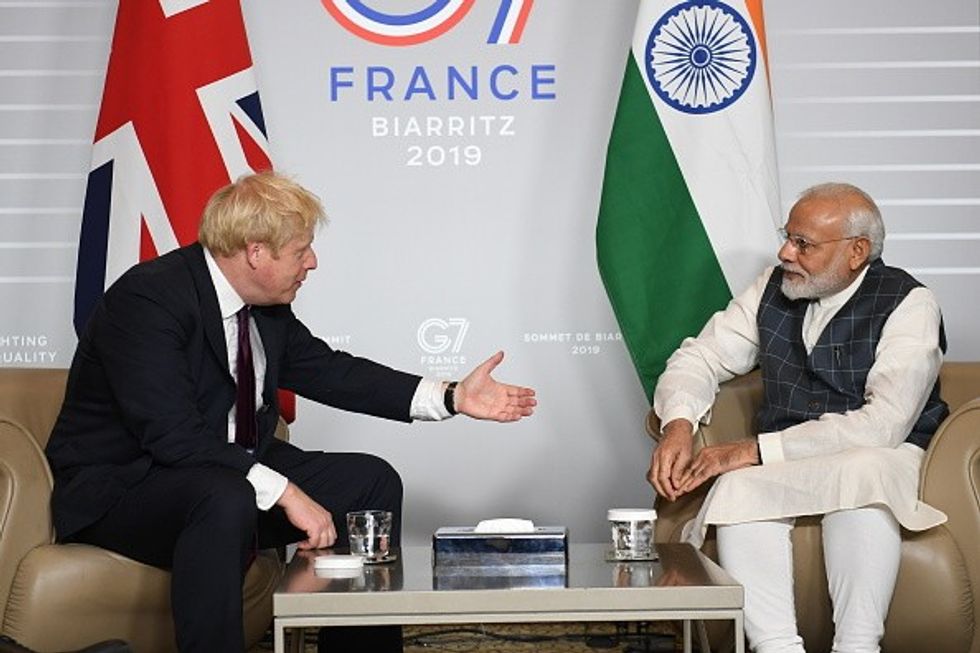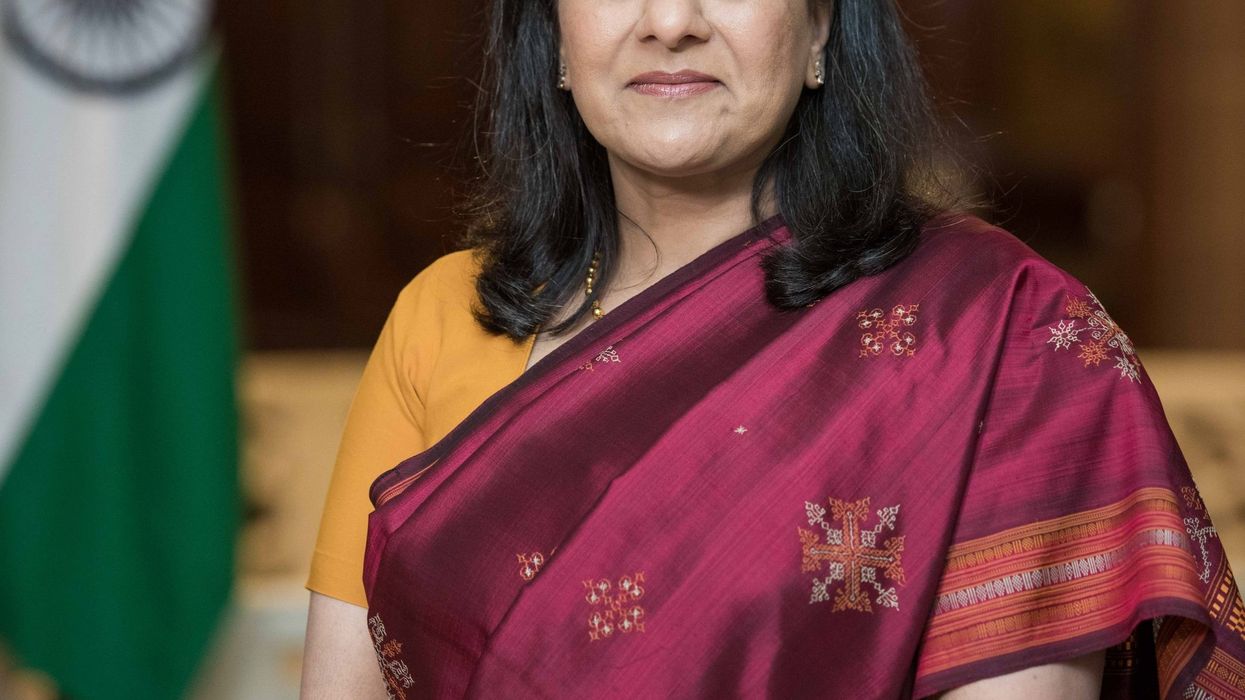In an exclusive interview with Eastern Eye, India’s High Commissioner to the UK, Gaitri Issar Kumar, reveals the change in dynamics of British-Indian ties and plans to celebrate the 75th anniversary of India’s independence.
You came to Britain came in the midst of the pandemic; how did you settle in and carry out your duties?
I consider it a privilege to serve India from this post in the capital of a key partner country –particularly in the midst of a global crisis in which India and the UK worked together successfully to find solutions.
The past year, 2020, brought unprecedented challenges for our country’s diplomatic missions - due to our citizens being stranded as borders closed down. Our governments coordinated round the clock to repatriate their respective nationals in both directions. In London and through our consulates, our high commission rose to the occasion to help students and employees affected by uncertainty and lockdown.
British communities across the UK - particularly those of Indian origin, were incredibly supportive. It was remarkable, the way volunteers took charge of rendering assistance to the vulnerable.
The most satisfying moment was when our friends and well-wishers from all strata of British society showered our mission with donations of oxygen-related equipment that we were able to rush to India – also with their help. We are in the process of procuring this equipment now for our longer-term preparedness in partnership with the British industry.
Despite the pandemic, the past year has been incredibly busy.
As a diplomat, I was delighted to have made introductory calls through the virtual medium across the board so efficiently and launch work on the India-UK agenda with the Foreign Office almost immediately on arrival.
We have had a series of high-level visits, both of the political as well as official leadership in both directions and a number of key achievements have made our efforts worthwhile - including far-reaching agreements such as the Migration and Mobility Partnership Agreement and Enhanced Trade Partnership Agreement.
Our cooperation on vaccines involving Wockhardt and Serum Institute of India is the best example of our complementarities.
Both prime ministers met virtually and have spoken on the telephone and we look forward to a very fruitful visit of the UK prime minister to India.
Officers of our high commission helped me to meet, almost every day, key interlocutors in different fields and, at least once a week, engage with at least one of the diverse interest groups and diaspora associations in different parts of the UK.
I have been most generously supported by the media in spreading my message of goodwill to the British people."
You’ve been in the post for over a year; what are your impressions of the British Indian community?
"Having met the colourful Indian community whose forefathers came to the UK from India and other parts of the world generations ago, I marvel at their achievements. As an envoy of my government, I cherish the way the government and people of the UK have made the Indian-origin people feel welcome, well-assimilated and secure in the communities where they live and work. They are proud they are represented in the Cabinet of the present government and have gone all out to support the India-UK Agenda.
In academics, science and research, apart from manufacturing and as investors, they are truly the ‘living bridge’ between India and the UK that our prime minister describes them to be.
The weekly ‘Chai with High Commissioner’ event was held virtually or, when permitted, in-person throughout the last year as a most precious engagement which has enabled me to connect with really interesting individuals and groups in a very direct way."
What are your key priorities for the Indo-British relationship? Has Brexit changed the dynamic of the relationship?
"Given the changing dynamics in a Covid impacted the world and in the light of the UK’s departure from the European Union, our prime ministers identified a new set of themes based on our respective priorities and convergences, which are reflected in the Roadmap 2030 announced on May 4, 2021. As Britain can now be more flexible and independent in its decision making and dialogue as well as commitments for cooperation with India, we find both countries are optimistic as we enter a new era of cooperation to achieve the many common aspirations of our people.
India and the UK are committed to our partnership in diverse sectors, from climate and sustainability to space and defence; from trade to medicine, from culture to education.
And let us not forget our deep and historic ties that enrich this journey and make our collaboration synergetic and purposive."

What has the past year been like for India?
"As in every part of the world, normal life in India, too, has been affected significantly and, in many regions, in a very tragic way. Our government’s entire focus has been on safeguarding lives and livelihoods and maintaining the morale of our resilient nation.
Interestingly, India was less severely affected in 2020 and despite the lockdowns and slowdown in our industry due to the exodus of migrant workers, investments into India actually increased by $20 billion last year. We hope to sustain recovery through a speedy vaccination programme which, we hope, will cover as much of the adult population of India as possible by the end of this year. At this moment, we are celebrating the sterling performance of Team India and the Olympic Games which has brought cheer and glory to India.
Covid-19, in the form of Delta variant, came like a tsunami to India earlier this year, but the rate of decrease in infections was also quite steep. As the world prepares for the third wave, India does, too, but this time with greater confidence and preparedness. Our capital, Delhi, with a population of around 20 million has, today, barely 39 new and a total of 498 active cases."
Some British politicians continue to be critical of India over issues like Kashmir and the treatment of minorities and women. What do you say to them?
"India and the UK are robust democracies where debate, discussion and dissent are at the foundation of their approach to issues. It is with dismay that our High Commission, at times, saw false assertions being made in the august Houses of Parliament about India - though the ground reality was well known to be quite different.
A year of interacting with the honourable representatives of the people across the board has enabled me to better understand the compelling reasons and local political dynamics behind these anti-India campaigns by known activists.
Fortunately, our efforts to bring authentic information to honourable parliamentarians is helping, and there is, today, a better appreciation of the complex issues related to Kashmir.
Today, in Kashmir, hope and optimism prevail as prosperity, modernity, education and socio-economic progress gains momentum - after decades of external interference, cross-border terror and constant incitement of youth, disturbance of school-going children, intimidation of ordinary people and discrimination against sections of society.
With the constitutional changes of August 2019, 106 laws became applicable in Jammu and Kashmir bringing, overnight, rights enjoyed by the rest of India, to women, children, workers and minorities. For the first time, investors are taking an interest in Kashmir and infrastructure development is progressing with tremendous momentum.
The Indian Union Territory of Jammu and Kashmir, today stands apart in stark contrast from Pakistan occupied Kashmir in a way that is there for all to see. Truth might not make for exciting headlines, but, eventually, it prevails. I am confident that honourable parliamentarians and representatives of the British people will welcome our updates and information on India-related issues in which they take a deep interest. We appreciate the position of the UK Government - and the Labour Party who have stated that Kashmir is a bilateral issue between the two counties concerned."
We are a year away from the 75th anniversary of independence, what is on the agenda for the country? What projects and goals does it have? How will the High Commission here celebrate this milestone?
"The 75th anniversary is a very important moment for India, especially the High Commission of India in the UK as it also marks the 75th year of India-UK relations.
The celebration of the 75th anniversary, Azadi ka Amrit Mahotsav or India@75, covers a variety of events and engagements - commencing in March 2021. Our celebrations will continue for over 75 weeks till August 15, 2022.
The high commission has hosted a number of activities, though many were virtual due to necessary health precautions.
In addition, a variety of economic and cultural engagements, however, could take place and our cultural wing, The Nehru Centre, has been more active than ever before with a following that has burgeoned due to the ease of attending events virtually."
What does the Indo-UK Roadmap 2030 entail for both sides?
"The 2030 Roadmap is a forward-looking plan that provides a timely reset of our bilateral relations post-Brexit and relies on the pillars of - medicine and healthcare; trade and economic cooperation; defence and security; climate and energy transition; and people-to-people linkages.
The success of the India-UK partnership in creating a vaccine that was “developed in the UK” and “Made in India” and supplied globally is just one recent example of the potential of the India-UK partnership - not only for bilateral benefit but also as a force for good at the global level. We envisage future cooperation to create a resilient supply chain in the pharma sector.
We are also preparing for an India-UK Healthcare Summit shortly - for which our mission will be a nodal point in the UK. This is also a crucial year for our cooperation in climate and sustainable development with the UK presidency of COP26 in Glasgow in November this year.
The Coalition for Disaster Resilient Infrastructure is a key initiative of India which, we hope, will find resonance in the strategies adopted by other member states and stakeholders.
As for trade and investment, this is a very significant area of our bilateral relationship with ambitious targets - to double our trade by 2030 and progress towards a successful Free Trade Agreement."
8. The GG2 Power List, which was published on July 28, showcases the wealth of talent in the British Indian community and the unique role they play in British society from politics, medicine, academia to business and the creative arts. Is this a source of pride to India and what is your message to them?
"I congratulate the Asian Media Group for bringing the spotlight on UK’s most influential Asians through the GG2 Power List. It will serve to inspire many more upcoming businesses to channel their leadership and talent towards more ambitious goals and greater success.
From media to medicine, from culture to climate, from trade to technology, this list is a celebration of the marvellous entrepreneurship and talent in the British Asian community."




